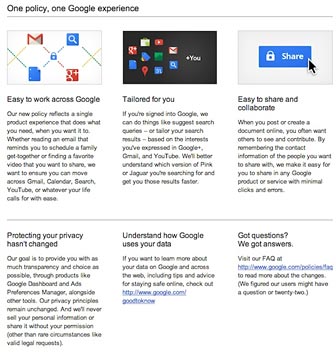Google Plus Strategy to get more Plus Clicks
All discussion about SEO seems to suggest getting Google Plus clicks will weight strongly for SEO rank - so how does one get visitors to click??? I visit websites all the time and it never occurs to me to click Google Plus icons if I see them. I look at my own websites and I don't see anyone clicking them. So, what is the attraction? How do we get people to click Google+ and what really is their motivation? If we set up some reward scheme, isn't that obvious and wouldn't it cause a flag?
As an example, I have this website capeschancklightstation.com.au where I've placed a Google Plus in the sidebar. I could probably make it bigger. I could probably put it in the body of the home page text, but really...
So, in theory I need to get some clicks. Can I click all my own websites so that I have at least 1 click? Or, would that be like clicking my own Adsense links?
Google Plus click exchange??? Well, it seems obvious that we could post websites here on WebPro with Google Plus buttons and then ask members to click each others Google Plus buttons. Would that have value?
BTW: If I was to click a bunch of Google +1 buttons for other webmasters more as a favour than a need, would that mess up my search results or cause some blow back in anyway?
They mean a whole lot for Google
Google announced this week that it is rolling out a new, main privacy policy that covers the majority of its products. The company is consolidating over 60 privacy notices into the main privacy policy. It's keeping a few separate for "legal and other reasons".
"Regulators globally have been calling for shorter, simpler privacy policies—and having one policy covering many different products is now fairly standard across the web," Google says.
Google users have been receiving emails about the changes:

You know that whole "Google+ is Google." mantra? Essentially what the new privacy policy means is that Google+ is in fact Google. It also means that Gmail is Google. YouTube is Google. Essentially, it affirms what we've been saying for quite some time. Google is the product, and all of Google's services are basically features of that product - the way Facebook is the product, and the news feed, photos, videos, chat, etc. are features of that product.
In Google's case, this concept embodies the majority of its products - the ones that aren't being kept separate for "legal and other reasons".
"The main change is for users with Google Accounts," explains Alma Whitten, Director of Privacy, Product and Engineering at Google. "Our new Privacy Policy makes clear that, if you're signed in, we may combine information you've provided from one service with information from other services. In short, we'll treat you as a single user across all our products, which will mean a simpler, more intuitive Google experience."
Whitten says Google's "Search Plus Your World" (or SPYW) is a good example of what Google can do when its products are one. Not everyone agrees that that is a "good" example. In fact, the move has been highly controversial, as is the new approach to privacy.
"Today we can also do things like make it easy for you to read a memo from Google Docs right in your Gmail, or add someone from your Gmail contacts to a meeting in Google Calendar," Whitten adds. "But there's so much more that Google can do to help you by sharing more of your information with … well, you. We can make search better—figuring out what you really mean when you type in Apple, Jaguar or Pink."
"We can provide more relevant ads too," says Whitten. "For example, it's January, but maybe you're not a gym person, so fitness ads aren't that useful to you. We can provide reminders that you're going to be late for a meeting based on your location, your calendar and an understanding of what the traffic is like that day. Or ensure that our spelling suggestions, even for your friends' names, are accurate because you've typed them before. People still have to do way too much heavy lifting, and we want to do a better job of helping them out."
The changes go into effect on March 1.
What are the people saying?
Here are some quotes from a WebmasterWorld thread on the topic:
Wow - what are they smoking in Mountain View?
At best this will cause massive bad publicity at worst it could be the start of a slippery slope for Google. I think this one may even capture the general public's attention.
Can't opt out? People are going to bail out!
The question will be will gmail users opting in (to continue using the service)? How many are going to give up their established gmail accounts? I know many gmail users who do not use any other G products... and some with gmail that use bing for search. Will be interesting to see how this shakes out.

No comments:
Post a Comment